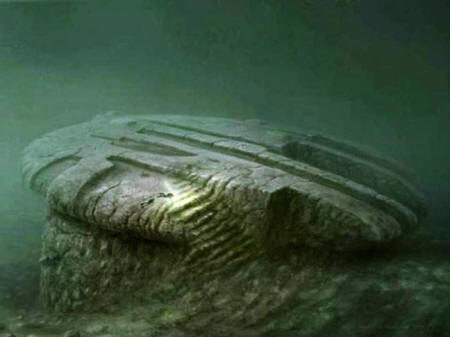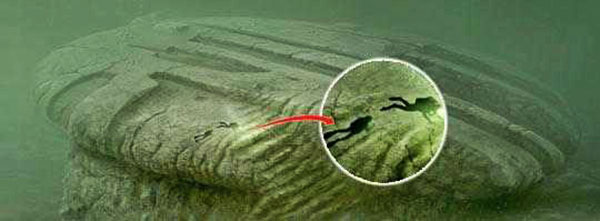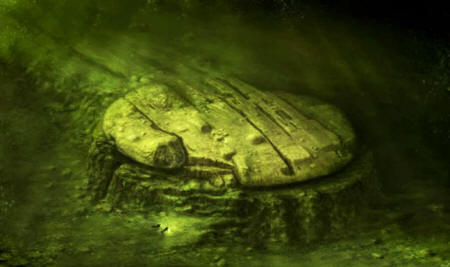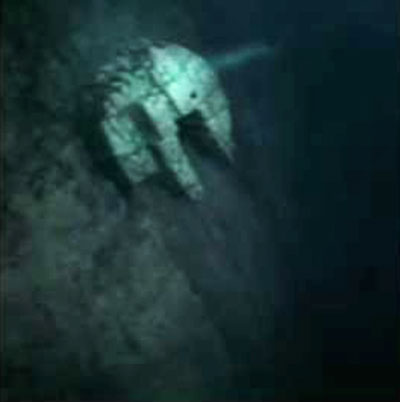|

May 30, 2014
from
BeforeItsNews Website
Spanish
version

"It is not an object which is man made in modern
time. What ever it is it’s either from during the
ice age or pre-ice age."
– Peter Lindberg,
February 24, 2013
"The object is older
than 140.000 yrs. Older than that… with straight
angles/lines - rounded corners… much like a "dinner
plate" and separate from the base below."
– Dennis Asberg,
September 28, 2012
There are THREE objects of interest:
-
the main 60 meter circular
anomaly
-
a smaller secondary object lying
approx. 200 meters from the 1st anomaly
with an area shaped like two "Gothic church windows"
-
a third anomaly - a 28 meters
high and 275 meters wide rock outcrop with a crack running
through it, lying some 1500 meters South of the circular
object, direct on the other end of the "trail".
The team has stated Anomaly 2 might turn
out to be the most interesting than the first, and they plan to dive
on it this time around.



-
The object lies at approx. 85-90
meter depth in international waters between Sweden & Finland
-
Conditions at site are poor -
visibility is low - 2-3 feet, low light levels, low
temperatures
-
60 meter in diameter, 4 meters
thick
Perfectly round, somewhat flattened
dome-shaped object made of a "rock-like" substance, although it is
not a rock formation.
There are rock formations, which appear
on the surface of the object.
This is what a sample was taken of on
the second expedition, NOT of the circular object itself.
"They hammered off a couple of
pieces from a huge rock formation on top of the circle, but it
seems like that part is not really a part of the larger circular
body.
We were thinking that if it is a
volcano the material with the smooth surface maybe was basalt
and that the rocks on top were ordinary rock that has been broke
and pushed up on top of the magma.
But since the divers hardly could
not see anything they just took samples from where they landed
and that was on the highest point."
- Peter Lindberg, July 22, 2012
The object seems to be very very old,
rare and something the crew has never seen before (Peter Lindberg
feels that it could be Pre-ice age.)
"I think you must think of this
object being there for a very long time, natural or made in some
way."
Peter Lindberg, July 22, 2012
"When I say the anomaly is not a rock i mean that it is not a
solid block of granite or some other 'stone' (like Ayers rock in
Australia.) That is the definition I have of a rock.
The anomaly is made of some other
material which I do not know what it is but I'm sure there are
several different materials @ the sight, you have 5-10 meter
deep layer of clay, that lies on top of the Scandinavian rock.
On top of the clay lies this
anomaly, and on top of the anomaly small stones of different
kind."
Stefan Hogeborn November 13, 2012
When asked if the anomaly was metal,
Peter Lindberg answered,
"Nothing like any metal I know any
way."
June 8, 2012
It seems like the circle is covered in a
very thin layer of sediment, but at certain locations the silt is
thicker, nearly like clay. I guess that the currents can stir the
silt up at these locations. When the divers scraped it off a
blackish surface appeared underneath.
Nearly the entire anomaly seems to be of the same material except a
piece of cliff where I have marked the black ring for the hole and
the blue ring where the the drop weight landed on the second dive
(south on the anomaly).
The team is not sure if it is just rocks
which are laying on the anomaly or if it is a part of it.
The surface of the circle is not entirely smooth, in some places it
is cracking. It appears to be covered in some type of hard
cement-like substance, mineral deposit. After being chipped, the
interior of object is black, like volcanic rock, almost petrified
inside. Material is very hard, not simple stone, described as
"preserved rock".
Stefan
Hogeborn describes the sense of
carbonized material.
The object has rounded sides with rugged edges (not smooth).
"It’s like someone has pinched the
mountain at the edge, as if you have moulded together two molds,
and it sticks out stones between the molds".
Stefan Hogeborn
"We can see this phenomena at
several different points on the anomaly. It appear to occur
where we have these structural corridors, cracks and such
things."
Peter Lindberg
There are two round holes in the circle.
One is 30 cm wide, and the other is approx. 2 meters wide and
surrounded by a square formation of 2 x 2 meters.
There are not only straight lined formations on the circle, there
appear to have construction lines and boxes drawn on it.
90 degree angle corridors 1.5 meters in height and 3 meter wide,
which are cut into the object. Divers said there was a "blackish"
powder that had been attracted to the cameras. Looks like something
has been very hot down there, so that the stone has melted.
Dennis believes this to be true because,
"some stones look like their up side
is burned. Also the blackish material which looks like it has
been poured out gives the sense that it might been some heat
down there."
Peter Lindberg, July 4, 2012
"The surface of the (circular)
object has cracks in it in some places 1-2 inches wide, and in
these cracks, it looks like something has poured out like magma…
If the magma had come out before the ice age, it should have
been scraped away by the ice, but now it’s there like it poured
out yesterday."
Earthfiles interview with Peter
Lindberg
As you understand it is very much in
this that points toward this not being just a "stone formation".
"The cracks seams not to be
irregular, they seams to go vertically or horizontally. Behind
them you can see a blackish colored mineral(?) with the
structure of old wooden planks."
Peter Lindberg, June 21, 2012
Dennis said that a volcano is possible,
however according to researchers, there has never been a volcanic
activity in the Baltic Sea.
Also, the object they found doesn’t look
like a volcano because of the perfect circular form of it and also
because of the 90 degree angles.
Peter Lindberg, on the other hand
feels they have found volcanic activity (see below) and this
volcano-like mountain (approx. 2 km away from the anomaly) will be
looked at on their next expedition.
"The entire anomaly has a thin layer
of silt on it and when the divers scraped it off a blackish
surface appeared underneath.
Nearly the entire anomaly seams to
be of the same material except a piece of cliff where I have
marked the black ring for the hole and the blue ring where the
the drop weight landed on the second dive.
We do not know if
that rocks just lays on the anomaly or if it is a part of it."
There is nearly no silt at all on the
anomaly, just a very thin layer.
You can clearly see the structure of the
surface through the silt. I as diver would refer it to what you find
on ships hull. You can clearly see the color but when you brush with
your hand over the surface you notice it is a "slimy" layer on it.

The circular object rests upon a 8 meter tall pillar/foundation.
"The foundation is more that it has
'popped up' like a cork or it has always been there but being
partly exposed by the ice or currents. It is more of a solid
cliff than bottom being pushed together to a conglomerate".
Peter Lindberg
The foundation increases in thickness,
to a dimension of 56 meters near the top where it meets the object.
On one side of circle (front), the
object is extending approximately 4-6 meters off from pillar. The
object does not appear to be connected to the pillar. There is a
wedge formed gap between the upper part (the circle) and the lower
part (pillar foundation).
Looks like granite, surface of anomaly
is made of different material than pillar.
"During the last expedition it was
confirmed that there is a wedge formed gap between the upper
part (the circle) and the lower part (foundation/pillar).
However, if the two parts are
completely separated or if the upper part and the lower part are
the same object has not been clarified".
Related Information
|




